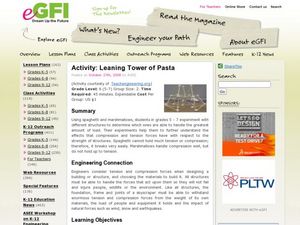Curated OER
Strong as the Weakest Link
Students recognize that compression and tension forces are important considerations in building structures. They construct their own building structure using marshmellows and spaghetti to see which structure can hold the most weight.
Teach Engineering
Fairly Fundamental Facts About Forces and Structures
Don't twist and turn looking for a resource. The first installment of a six-part series teaches young engineers about the five fundamental forces of compression, tension, shear, bending, and torsion. These forces help explain different...
Curated OER
Wind Effects on Model Building: Pre-Lab for Truss Design and Testing
Emerging engineers perform pre-lab calculations in this first of a three-part lesson on model building. They determine the forces of tension and compression in a truss. After completion of the worksheet, pupils will draw a draft of their...
Teach Engineering
Doing the Math: Analysis of Forces in a Truss Bridge
Join together to investigate truss joints. Scholars learn how to analyze forces at truss joints to determine the strength of truss bridges. They apply the "method of joints" in calculating the tension and compression forces at each joint...
Curated OER
Bridge Building, Tension, and Compression
Learners demonstrate tension and compression using real world examples. In this forces lesson, students demonstrate tension on a suspension bridge. They demonstrate compression on different roof designs.
EduGAINs
Form and Function
Will that structure survive the force? The differentiated lesson allows pairs to choose the structure they would like to construct and the building materials they wish to use. Individuals record their findings in...
Teach Engineering
Exploring the Forces of Tension
Let the resource stretch the minds of your young scientists with a lesson about tensile strength and stiffness of materials. Groups consider how easily materials stretch and relate this property to engineering design.
Curated OER
Tension and Compression
Learners experience the forces of tension and compression by manipulating objects that are strong in each but not in both. Students construct a simple model of a beam bridge.
Curated OER
Tension and Compression
Students explore the forces of tension and compression by manipulating a variety of objects, and apply what they learned in the construction of a model bridge.
Teach Engineering
Bridging the Gaps
The London Bridge should not have fallen down. And here's why. After a brief history of bridges and the three main types, class members are introduce to the concepts of tension and compression, the two main forces acting upon bridges.
Curated OER
Forces, Loads, Materials, Shapes
Students investigate forces, loads, materials and shapes as they relate to science. For this science lesson, students differentiate between the basic definitions required to perform a scientific experiment. They answer questions dealing...
Curated OER
Stressed and Strained
Students explore stress and strength in engineering design. For this engineering lesson, students become familiar with terminology associated with stress and strain on building material. They will have a class discuss about how their...
Curated OER
Tension and Compression
Students examine tension and compression by manipulating objects that are strong in each but not in both. Students apply their observations to the construction of a model of a beam bridge, suspension bridge, and inverted triangle...
Curated OER
Building Bridges
Students, in groups, design and test a scale bridge. They use the Internet to research three basic bridge designs -- beam, arch, and suspension -- and the forces that act upon them.
Curated OER
Paper Suspension Bridges: You Want Me To Go Up There?
A few class periods will be required to complete this physics investigation with your high schoolers. There is an unavailable video written into the lesson plan, but there is plenty of material here to bridge the gap. Two terrific...
Curated OER
Strong as the Weakest Link
Students apply knowledge of stresses and forces by building model structures. In this force lesson, students consider skyscrapers and bridges in the world around them and the stresses that these structures endure. They use their...
Curated OER
Stable and Unstable Structures
Students research three major bridge collapses. In this Physical Science lesson plan, students will sketch a bridge design for their area after their research. All bridge designs will be presented to the class to discuss strengths and...
Curated OER
Forces and Balloons
Students investigate the forces of compression, tension and torque on common birthday balloons.
Curated OER
Types of Forces
Students study scientific names and descriptions of forces. In this motion lesson students organize information into a graphic organizer then teach it to other students.
Curated OER
Freestanding Structures: A Tech Museum Floor Activity
Young scholars attempt to design the tallest structure that they can with the given materials which are wooden dowels and rubber bands. They discuss the physics of their structure and how they would improve it the next time they built a...
Curated OER
Strong as the Weakest Link
Students discover the types of stress that materials undergo. They examine how bridges and skyscrapers are built to withhold the tension. They create their own structure out of marshmallows and spaghetti.
Curated OER
Activity: Leaning Tower of Pasta
A well-laid-out lesson plan, this can be used in an engineering, STEM, or physical science course. Laboratory groups design a structure using pasta and marshmallows, measure its height and weight, and then discover the load that it can...
Curated OER
TE Activity: Testing Fundamental Loads
Learners experiment with the five fundamental load types that can act on structures. They use foam insulation blocks to which they apply the forces and draw the fracture patterns. They determine the telltale marks of failure that is...
Curated OER
Forces on the Human Molecule
Students conduct several simple lab activities to explore the five fundamental load types that can act on structures: tension, compression, shear, bending, and torsion. In this activity, students play the role of molecules in a beam...




















